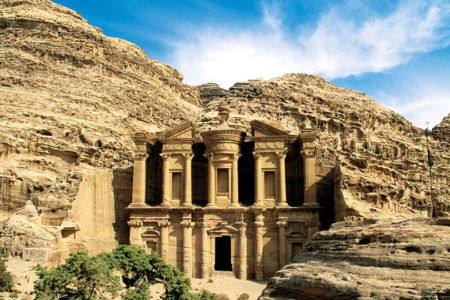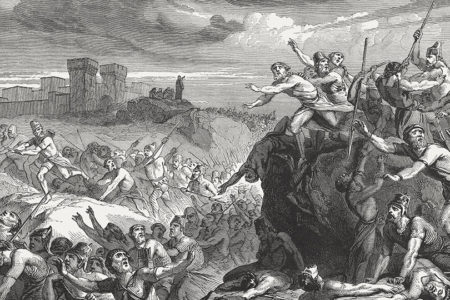The Folly of Misplaced Trust Obadiah 5—9
Most Americans remember where they were on 9/11. We remember our vulnerability; our politicians singing together on the Capitol steps in Washington, DC; the national prayer meetings; the choruses of “God Bless America” at ballparks; the packed churches; and the frequent quoting of Psalm 46:1: “God is our refuge and strength, a very present help in trouble.”
But the flurry of church attendance, prayer, and Bible-quoting soon died. The God-consciousness faded. And though American money still reads “In God We Trust,” most Americans rarely consider the Almighty, let alone trust in Him.
Sadly, self-sufficiency, conceit, and spiritual complacency reign. Who needs God?
Americans and many others around the world are much like the ancient Edomites. Through the prophet Obadiah, God warned the Edomites their pride and arrogance would precipitate their downfall (Obad. 3).
But the book of Obadiah is more than an oracle of judgment against wicked Edom. It is an exposé of the folly of misplaced trust. Edom’s substitutes for God amazingly parallel those of today.
Possessions. Edom was located on a major trade route. As a center of commerce, it had made its merchants wealthy. Yet when judgment came, no treasures would be left behind: “Oh, how Esau shall be searched out [plundered]!” (v. 6).
The Bible warns mankind about the unreliability of riches: “For riches certainly make themselves wings; they fly away” (Prov. 23:5). That is why the apostle Paul cautioned the wealthy not to “trust in uncertain riches but in the living God” (1 Tim. 6:17).
It is not wrong to have possessions; but good things that take the place of God become bad things.
Those of us who live in a land of material abundance need to ask ourselves some hard questions. Are we happier when our cars are new or our suits are expensive?
Though it is not wrong to have bank accounts, nice homes, plenty of insurance, or good investment portfolios, are these the things that give us security and confidence about our future? They could disappear in a day.
Position. Based on their treaties and alliances, the Edomites thought their position in the ancient Near East was secure.
“The men in your confederacy…the men at peace with you…those who eat your bread [a token of covenant and friendship in that culture]” are descriptions of Edom’s misplaced confidence in its political position (Obad. 7).
Human relationships can disappoint, even deceive us, if we rely on them for security. It’s not wrong to want to get married, work for a certain company, or become an officer in a particular organization. But it is wrong to depend on such things for security. Our trust should be in God, not in our position or relationships.
Perception. “‘Will I not in that day,’ says the Lᴏʀᴅ, ‘even destroy the wise men from Edom, and understanding from the mountains of Esau?’” (v. 8).
Edom was renowned for its schools of wisdom, proverbs, and intelligentsia. As a cosmopolitan center of trade, it claimed to have the latest in worldly ideas and perceived itself to be a highly developed civilization.
Today’s culture worships academics, education, and advanced degrees. Knowledge, of course, is a good thing; but apart from God, it cannot produce wisdom. Instead, it “puffs [one] up” (1 Cor. 8:1).
Wisdom does not come from academics: “The fear of the Lᴏʀᴅ is the beginning of wisdom” (Ps. 111:10). If we trust in our own perception and education, we are foolish.
No wonder godly believers shake their heads in incredulity as some of the most brilliant minds in society promote agendas that take us far from God and common sense.
Power. In his prophetic vision, Obadiah saw that the “mighty men” and “everyone from the mountains of Esau” would be destroyed (Obad. 9).
Edom’s military might and secure, fortresslike cities in the mountains would not prevent its demise.
History records that “in the late sixth or early fifth century BC the Nabateans, from northern Arabia, worshipers of gods and goddesses of fertility and the celestial bodies, drove out most of the Edomites….The Nabateans went to the Edomites who took them in for a banquet. Once welcomed inside Edomite territory, the Nabateans turned against their ally and killed the guards.”1
Military might, political alliances, and impregnable fortresses could not provide lasting security.
Many believers grieve that America today, much like ancient Edom, suffers from misplaced trust. It relies on its possessions, position, perception, and power. We pray for repentance and the day when “In God We Trust” will be more than a slogan.
Yet we must also admit that while faith is what pleases God (Heb. 11:6), it is easy to trust in other things. It can be scary to trust God alone. C. S. Lewis’s children’s book The Silver Chair illustrates this fear.
Lewis pictured the Lord Jesus as a great lion, Aslan. Jill was desperately thirsty; but the lion crouched between her and the refreshing stream. “If you are thirsty, come and drink,” invited the Lion.
“Will you promise not to—do anything to me, if I do come?” said Jill.
“I make no promise,” said the Lion.
“Do you eat girls?” she said.
“I have swallowed up girls and boys, women and men, kings and emperors, cities and realms,” said the Lion….
“Oh dear!” said Jill, coming another step nearer. “I suppose I must go and look for another stream then.”
“There is no other stream,” said the Lion.2
Lewis then wrote, “It was the worst thing she had ever had to do, but she went forward to the stream, knelt down, and began scooping up the water in her hand. It was the coldest, most refreshing water she had ever tasted.”3
Trusting Christ is how we start a relationship with God. Trusting Christ is also how we take every step in the Christian life. Trusting Him alone, instead of the enticing and often more comfortable substitutes, will stretch our faith. And it will quench our thirsty souls as nothing else can.
ENDNOTES
- Walter L. Baker, “Obadiah,” The Bible Knowledge Commentary, ed. John F. Walvoord and Roy B. Zuck (Wheaton, IL: Victor Books, 1983) 1:1455–6.
- C. S. Lewis, The Silver Chair (New York, NY: Macmillan, 1953), 17–18.
- Ibid.








